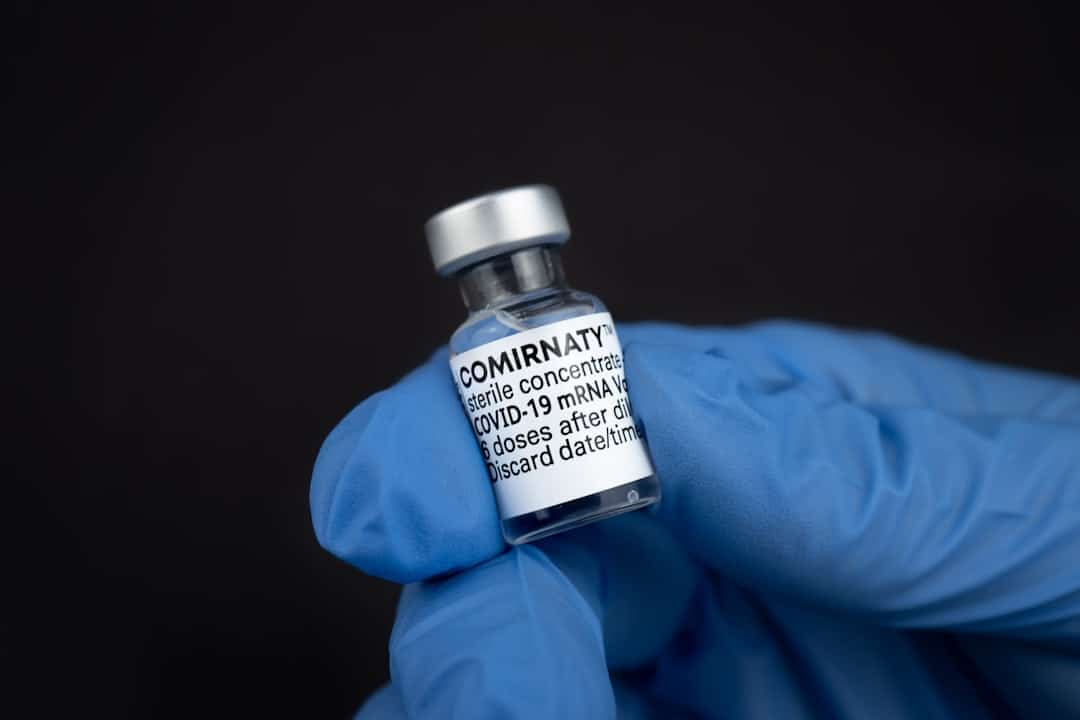Messenger RNA (mRNA) technology has emerged as a groundbreaking innovation in the field of biotechnology and medicine, particularly in the realm of vaccine development. At its core, mRNA serves as a molecular blueprint that instructs cells to produce specific proteins. This process is fundamental to cellular function and is harnessed in mRNA vaccines to elicit an immune response against pathogens.
Unlike traditional vaccines, which often use weakened or inactivated forms of a virus, mRNA vaccines utilize synthetic strands of genetic material that encode for viral proteins. This approach allows for a rapid response to emerging infectious diseases, as seen during the COVID-19 pandemic. The development of mRNA technology has been accelerated by advances in molecular biology and genetic engineering.
Researchers have been able to design mRNA sequences that can be easily modified to target various pathogens. The success of the Pfizer-BioNTech and Moderna COVID-19 vaccines has brought mRNA technology into the spotlight, demonstrating its potential not only for rapid vaccine development but also for high efficacy and safety profiles. The ability to produce these vaccines quickly and at scale has revolutionized public health responses to infectious diseases, setting the stage for further exploration of mRNA applications beyond just vaccines.
Key Takeaways
- mRNA technology is a revolutionary approach to vaccine development that uses genetic material to stimulate an immune response.
- Current applications of mRNA vaccines include the successful development of COVID-19 vaccines by Pfizer-BioNTech and Moderna.
- There is potential for mRNA vaccines to be used in multi-disease vaccines, offering a more efficient and cost-effective approach to vaccination.
- Challenges and limitations of mRNA technology include stability issues, potential immune responses, and the need for cold storage.
- Advancements in mRNA vaccine research are focused on improving stability, delivery methods, and expanding the range of diseases that can be targeted.
Current Applications of mRNA Vaccines
The most prominent application of mRNA technology has been in the development of vaccines against infectious diseases, particularly COVID-19. The Pfizer-BioNTech and Moderna vaccines have shown remarkable efficacy rates, with clinical trials indicating effectiveness rates exceeding 90% in preventing symptomatic COVID-19 infection. These vaccines work by introducing a small piece of mRNA that encodes the spike protein of the SARS-CoV-2 virus.
Once administered, human cells utilize this mRNA to produce the spike protein, which then triggers an immune response, including the production of antibodies and activation of T-cells. Beyond COVID-19, mRNA vaccines are being explored for other infectious diseases. For instance, researchers are investigating mRNA-based vaccines for influenza, Zika virus, rabies, and even HIV.
The flexibility of mRNA technology allows for rapid modifications to target different pathogens, making it an attractive option for addressing emerging infectious diseases. Clinical trials are underway for several of these vaccines, with early results indicating promising immune responses. The adaptability of mRNA platforms could potentially lead to a new era of vaccine development that is more responsive to global health threats.
Potential for Multi-Disease Vaccines

One of the most exciting prospects of mRNA technology is its potential to create multi-disease vaccines. The concept involves combining multiple mRNA sequences into a single vaccine formulation that can target several pathogens simultaneously. This approach could significantly streamline vaccination efforts, reduce the number of injections required, and enhance public compliance with vaccination programs.
For example, researchers are exploring the possibility of developing a combined vaccine that targets both influenza and COVID-19, which would be particularly beneficial during overlapping seasonal outbreaks. The ability to encode multiple antigens within a single mRNA strand opens up new avenues for vaccine design. By leveraging the modular nature of mRNA technology, scientists can create vaccines that not only target different strains of a virus but also different viruses altogether.
This could lead to the development of a universal flu vaccine or a combination vaccine that protects against multiple respiratory viruses. The implications for global health are profound, as such multi-disease vaccines could simplify immunization schedules and improve overall vaccination coverage.
Challenges and Limitations of mRNA Technology
Despite its promise, mRNA technology is not without challenges and limitations. One significant hurdle is the stability and delivery of mRNA molecules. Unlike traditional vaccines that can often be stored at standard refrigeration temperatures, mRNA vaccines typically require ultra-cold storage conditions to maintain their integrity.
This poses logistical challenges, particularly in low-resource settings where cold chain infrastructure may be inadequate. Efforts are ongoing to develop more stable formulations that can withstand higher temperatures, which would facilitate broader distribution. Another challenge lies in the potential for adverse reactions.
While mRNA vaccines have demonstrated excellent safety profiles in clinical trials, there are still concerns regarding rare side effects and long-term safety data. Monitoring systems are in place to track adverse events post-vaccination, but the relatively new nature of this technology means that long-term effects are still being studied. Additionally, public hesitancy surrounding new vaccine technologies can pose barriers to widespread acceptance and uptake.
Advancements in mRNA Vaccine Research
Research into mRNA technology is advancing rapidly, with scientists exploring innovative ways to enhance its efficacy and broaden its applications. One area of focus is improving the delivery mechanisms for mRNA vaccines. Lipid nanoparticles have been used successfully to encapsulate mRNA and facilitate its entry into cells; however, researchers are investigating alternative delivery systems that could enhance cellular uptake and reduce potential side effects.
For instance, new formulations using polymer-based carriers or even viral vectors are being studied to improve the stability and effectiveness of mRNA vaccines. Additionally, there is ongoing research into optimizing the design of mRNA sequences themselves. By modifying codons or incorporating novel elements such as untranslated regions (UTRs), scientists aim to enhance protein expression levels and improve immune responses.
Furthermore, studies are being conducted to explore the use of adjuvants—substances that enhance the body’s immune response—to boost the effectiveness of mRNA vaccines against various pathogens.
Ethical and Regulatory Considerations

As with any emerging technology, ethical and regulatory considerations play a crucial role in the development and deployment of mRNA vaccines. The rapid pace at which these vaccines were developed during the COVID-19 pandemic raised questions about the adequacy of safety assessments and regulatory oversight. Regulatory agencies such as the U.S.
Moreover, ethical considerations extend beyond safety and efficacy assessments. Issues related to equitable access to vaccines are paramount, particularly in low- and middle-income countries where resources may be limited.
The global distribution of COVID-19 vaccines highlighted disparities in access, prompting discussions about intellectual property rights and vaccine sharing initiatives such as COVAX. Ensuring that all populations have access to innovative technologies like mRNA vaccines is essential for achieving global health equity.
Impact on Global Health
The impact of mRNA technology on global health has been profound, particularly in light of the COVID-19 pandemic. The rapid development and deployment of effective vaccines have played a critical role in controlling the spread of the virus and reducing severe illness and mortality rates worldwide. Countries that successfully implemented vaccination campaigns have seen significant declines in COVID-19 cases and hospitalizations, underscoring the importance of vaccination as a public health strategy.
Furthermore, the success of mRNA vaccines has reinvigorated interest in vaccine research and development more broadly. Governments and private entities are investing heavily in biotechnology research, recognizing the potential for mRNA technology to address not only infectious diseases but also chronic conditions such as cancer and autoimmune disorders. This renewed focus on innovation could lead to breakthroughs that transform healthcare delivery and improve health outcomes on a global scale.
Future Outlook for mRNA Multi-Disease Vaccines
Looking ahead, the future of mRNA multi-disease vaccines appears promising as researchers continue to explore their potential applications across various fields of medicine. The ability to create versatile vaccine platforms capable of addressing multiple pathogens simultaneously could revolutionize immunization strategies worldwide. As scientists refine delivery methods and optimize mRNA designs, we may see an increase in combination vaccines that target prevalent diseases such as influenza, RSV (respiratory syncytial virus), and even emerging zoonotic viruses.
Moreover, advancements in personalized medicine may further enhance the utility of mRNA technology. Tailoring vaccines based on individual genetic profiles or specific disease risks could lead to more effective immunization strategies tailored to diverse populations. As research progresses and regulatory frameworks adapt to accommodate these innovations, we may witness a paradigm shift in how we approach disease prevention through vaccination.
In conclusion, while challenges remain in terms of logistics, public acceptance, and ethical considerations, the trajectory of mRNA technology suggests a transformative impact on global health initiatives. The potential for multi-disease vaccines represents a significant leap forward in our ability to combat infectious diseases efficiently and effectively, paving the way for a healthier future for populations around the world.
In a recent article discussing the future of mRNA technology in multi-disease vaccines, it is interesting to note the top trends on Instagram for 2023. The rise of social media platforms like Instagram has played a significant role in shaping public opinion and awareness of new technologies in the healthcare industry. To stay updated on the latest technology news and reviews, check out this original home for technology news and reviews. Additionally, for those interested in wearable technology, a review of Huawei smartwatches is available to provide insights into the latest advancements in this field. Stay informed and connected with the latest trends and developments in technology by exploring these articles. Top Trends on Instagram 2023, An Original Home for Technology News and Reviews, Smartwatches Huawei Review
FAQs
What is mRNA technology?
mRNA technology is a type of vaccine technology that uses messenger RNA to instruct cells in the body to produce a protein that triggers an immune response. This immune response helps the body recognize and fight off the targeted virus or disease.
How does mRNA technology work in vaccines?
mRNA vaccines work by delivering a small piece of genetic material from the virus or disease into the body’s cells. The cells then use this genetic material to produce a protein that triggers an immune response, creating antibodies to fight off the virus or disease.
What are the potential benefits of using mRNA technology in multi-disease vaccines?
Using mRNA technology in multi-disease vaccines has the potential to provide a more efficient and rapid response to emerging infectious diseases. It also offers the possibility of creating a single vaccine that can protect against multiple diseases, simplifying vaccination schedules and increasing accessibility to vaccines.
What are some of the challenges associated with developing multi-disease vaccines using mRNA technology?
Challenges in developing multi-disease vaccines using mRNA technology include ensuring the stability and effectiveness of the mRNA molecules, addressing potential immune responses to multiple antigens, and navigating regulatory and manufacturing complexities for combination vaccines.
What are some of the potential future applications of mRNA technology in vaccines?
In addition to multi-disease vaccines, mRNA technology has the potential to be used in personalized cancer vaccines, therapeutic vaccines for chronic diseases, and as a platform for rapid response to new infectious diseases. Ongoing research and development are exploring these and other potential applications.

